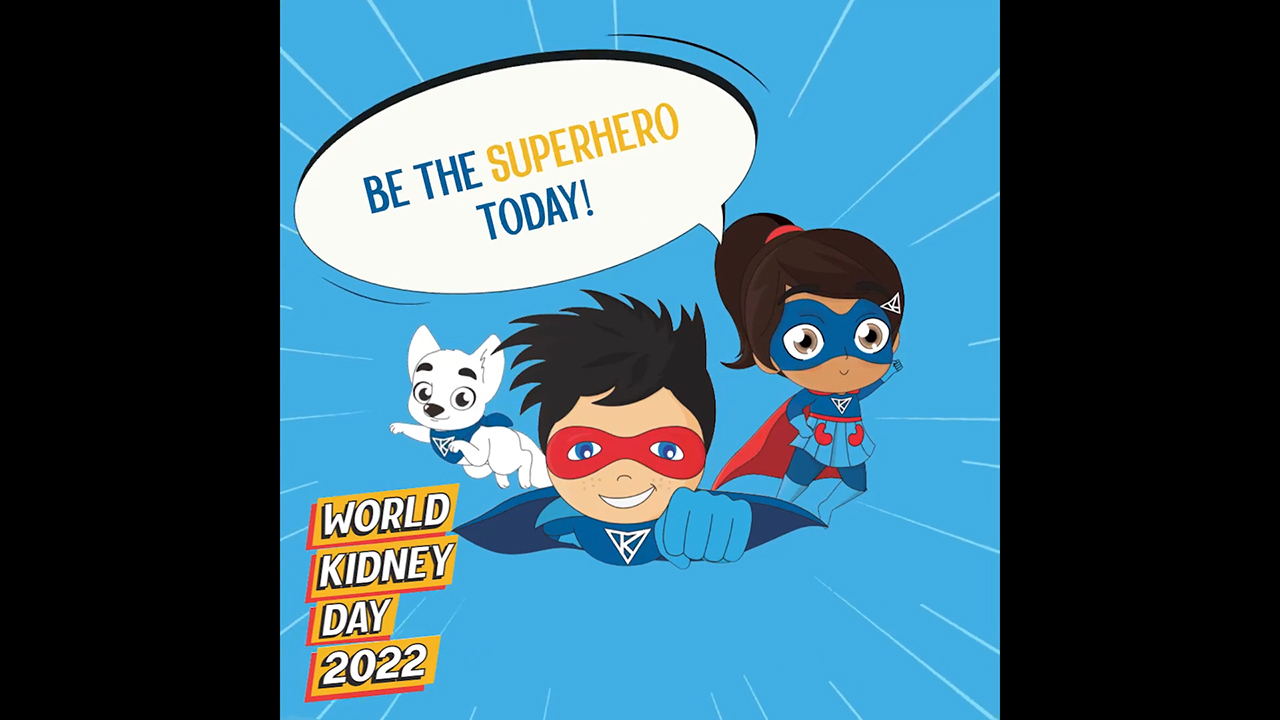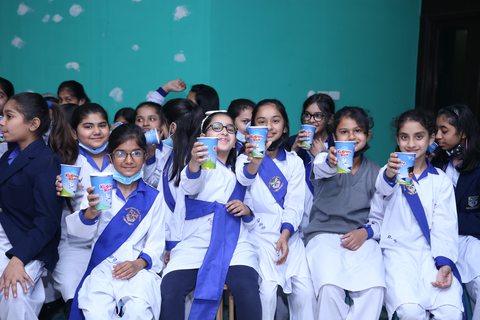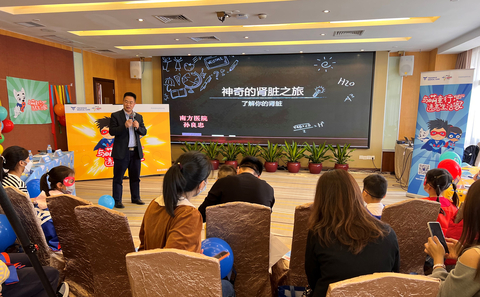HONG KONG--(BUSINESS WIRE)--Fresenius Medical Care, the world’s leading provider of products and services for individuals with renal diseases, has today announced the social media expansion of its highly successful global Corporate Social Responsibility (CSR) initiative, The Kidney Kid. This colorful superhero character, who is on a mission to help children and their carers learn more about their ‘super organ’ kidneys and how to keep them healthy, will further its reach to millennial parents through social media channels. The initiative’s latest development comes on World Kidney Day 2022, which is urging the community, healthcare workers, and public health policymakers to Bridge the knowledge gap to better kidney care – which aligns precisely with The Kidney Kid’s mission.
Since its inception in 2014, The Kidney Kid ‘edutainment’ (education + entertainment) program has engaged directly with tens of thousands of children through face-to-face events. Following The Kidney Kid’s digital and international growth in 2020, the superhero has connected with even more children across four continents. Now, to coincide with World Kidney Day 2022, The Kidney Kid will become social, via Facebook and Instagram. The aim is to reach families with preventative kidney health messages that resonate across age groups, cultures and literacy levels.
Fresenius Medical Care’s worldwide community is creating further opportunities to foster the exchange of kidney health knowledge between individuals, communities and healthcare professionals. These will include the launch of The Kidney Kid’s partnership with the Boys & Girls Clubs of America, where the superhero will share its health messages through this vast network. Other events include a virtual media conference organized by local renal societies in Indonesia and awareness events at schools and children’s hospitals in China. A new Kidney Kid animation series is also being developed.
“The need to strengthen The Kidney Kid’s reach has become even more critical”, said Harry de Wit, CEO of Fresenius Medical Care Asia Pacific and President Europe, Middle East and Africa (EMEA). “The World Kidney Day Organization has highlighted that there is a persistent knowledge gap that is stifling the fight against kidney disease and increasing its mortality.1 The 2022 World Kidney Day special report goes as far as saying that most people are not aware of what the kidneys are for – or even where their kidneys are”.2
Amongst the many barriers to understanding kidney health and preventing kidney disease is low health literacy, which impacts the ability of people to find, understand, and use information and services to make health-related decisions for themselves and others.2 Low health literacy is alarmingly common across both developing and developed economies. A review across Southeast Asia found that almost 70 per cent of patients in healthcare settings had low health literacy.3 In the USA, the proportion of adults with basic or below basic health literacy ranges from 28 per cent of white adults to 65 per cent of Hispanic adults.4 While across Europe, nearly half of all adults in eight countries tested had inadequate or problematic health literacy skills.5
Policymakers, as well as healthcare professionals and organizations, are increasingly looking for new ways to bridge the gap between health literacy and people’s understanding of kidney disease. Indeed, it was recognition of this gap that led to Fresenius Medical Care creating The Kidney Kid from as early as 2014. As the digitalization and impact of the superhero’s kidney health messages have grown, so too has the literature supporting visual multimedia-based information to enhance the delivery of health information in communities with low health literacy. In particular, research has shown that animation is one of the most effective ways to communicate complex health information to people with both low and high health literacy. Animated information is perceived as non-threatening, familiar and accessible across age groups, cultures and literacy levels. By holding viewers’ attention, it may also improve the recall of information.6,7
The Kidney Kid’s animated adventures, which promote healthy kidney behaviors, are available to children, parents, and teachers across comics, activities, games, and videos through The Kidney Kid game app and website, as well as print materials. The next challenge is to widen the influence of these messages, which is possible through social media, where many new parents turn for parenting information.8
“By communicating directly with parents through Facebook and Instagram, and involving them in our ‘I am The Kidney Kid’ campaign using a digital filter to become their own kidney health ambassadors, we can offer parents a new way of connecting with their children while providing the credible information they are seeking”, said Mr. de Wit. “We know from research that the middle childhood years are critical for the adoption of health behaviors that can have lifelong consequences, and we are excited about this novel way of bridging the knowledge gap to better kidney health worldwide”.9
Follow The Kidney Kid on Instagram @the.kidney.kid and Facebook @thekidneykid.org
To download The Kidney Kid app, please visit the App Store or Google Play and search for ‘The Kidney Kid’.
Visit The Kidney Kid website at thekidneykid.org
References
- World Kidney Day. 2022 WKD Theme. Campaign Toolkit. Available from https://www.worldkidneyday.org/2022-campaign/2022-wkd-theme/. Accessed February 2020.
- Langham, R., Kalantar-Zadeh, K., Bonner, A., Balducci, A., Hsiao, L., & Kumaraswami, L. et al. (2022). Kidney health for all: bridging the gap in kidney health education and literacy. Kidney International. https://doi.org/10.1016/j.kint.2021.12.017
- Rajah, R., Hassali, M., & Murugiah, M. (2019). A systematic review of the prevalence of limited health literacy in Southeast Asian countries. Public Health, 167, 8-15. https://doi.org/10.1016/j.puhe.2018.09.028
- U.S. Department of Health and Human Services. (2008). America’s Health Literacy: Why We Need Accessible Health Information – An issue brief.
- World Health Organization. (2013). Health literacy. The solid facts. Copenhagen. Retrieved from https://apps.who.int/iris/bitstream/handle/10665/128703/e96854.pdf
- George, S., Moran, E., Duran, N., & Jenders, R. (2013). Using Animation as an Information Tool to Advance Health Research Literacy among Minority Participants. AMIA Annual Symposium Proceedings, 475-84. Retrieved February 2022, from https://www.ncbi.nlm.nih.gov/pmc/articles/PMC3900192/.
- Meppelink, C., van Weert, J., Haven, C., & Smit, E. (2015). The Effectiveness of Health Animations in Audiences With Different Health Literacy Levels: An Experimental Study. Journal Of Medical Internet Research, 17(1), e11. https://doi.org/10.2196/jmir.3979
- Fromm, J. (2016). When Marketing To Millennial Parents: Authenticity Is Required. Forbes. Retrieved February 2022, from https://www.forbes.com/sites/jefffromm/2016/09/21/when-marketing-to-millennial-parents-authenticity-is-required/?sh=5341ca954d85.
- Early and Middle Childhood | Healthy People 2020. Healthypeople.gov. (2022). Retrieved March 2022, from https://www.healthypeople.gov/2020/topics-objectives/topic/early-and-middle-childhood.
ABOUT FRESENIUS MEDICAL CARE
Fresenius Medical Care is the world's leading provider of products and services for individuals with renal diseases of which around 3.8 million patients worldwide regularly undergo dialysis treatment. Through its network of 4,171 dialysis clinics, Fresenius Medical Care provides dialysis treatments for 345,000 patients around the globe. Fresenius Medical Care is also the leading provider of dialysis products such as dialysis machines or dialyzers. Along with the core business, the company focuses on expanding the range of related medical services in the field of Care Coordination. Fresenius Medical Care is listed on the Frankfurt Stock Exchange (FME) and on the New York Stock Exchange (FMS)
For more information visit the company’s website at www.freseniusmedicalcare.asia.
DISCLAIMER
This release contains forward-looking statements that are subject to various risks and uncertainties. Actual results could differ materially from those described in these forward-looking statements due to various factors, including, but not limited to, changes in business, economic and competitive conditions, legal changes, regulatory approvals, results of clinical studies, foreign exchange rate fluctuations, uncertainties in litigation or investigative proceedings, and the availability of financing. These and other risks and uncertainties are detailed in Fresenius Medical Care AG & Co. KGaA's reports filed with the U.S. Securities and Exchange Commission. Fresenius Medical Care AG & Co. KGaA does not undertake any responsibility to update the forward-looking statements in this release.





